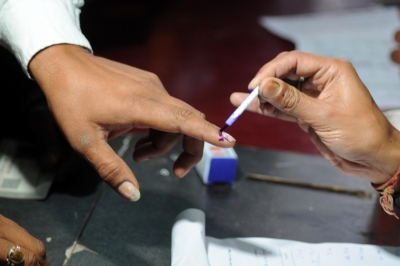Implementing ancient TN electoral system will be a major electoral reform
By IANS | Published: March 13, 2021 10:22 AM2021-03-13T10:22:22+5:302021-03-13T18:50:43+5:30
Chennai, March 13 Implementing the ancient Tamil Nadu system of electing people's representatives will be a major electoral ...

Implementing ancient TN electoral system will be a major electoral reform
Chennai, March 13 Implementing the ancient Tamil Nadu system of electing people's representatives will be a major electoral reform that would clean up the existing system, is the general view of the people who visit Uthiramerur and see the stone inscriptions.
The present system of electing people's representatives is not a foreign import but was practiced even way back 920 AD as per the inscriptions in a temple in Uthiramerur in Kancheepuram district about 90 km from here.
"Electoral systems in ancient times can be seen in temple stone inscriptions in Uthiramerur, Madurai and other regions," Archaeologist G. Thirumoorthy told .
Not only electing their representatives, people then had the right to recall their elected representatives, state the stone inscriptions.
It is election time in four Indian states and one Union Territory viz Assam, Kerala, Tamil Nadu, West Bengal and Puducherry.
People in these regions will elect their representatives for the Legislative Assembly.
As a part of the poll process, political parties have started announcing the candidates and the poll body Election Commission (EC) will run and manage the show.
Prime Minister Narendra Modi while laying the foundation stone for the new Parliament building in December 2020 pointing Uthiramerur said, "There are inscriptions on stones in Tamil language about the Panchayat system prevalent during the Chola Empire in the 10th century."
"It explains how every village was categorized as Kudumbu, which we call the ward today. One representative from these kudumbus was sent to the General Assembly, as it happens today. The General Assembly, which used to take place in this village thousands of years ago, is still there," Modi said.
He also said the stone inscriptions also mention the disqualification norms for the candidate who contests in the election.
"And, the rule was that the public representative or his close relatives would not be able to contest the elections if he fails to furnish the details of his property," the Prime Minister said.
In those days, the village assembly drafted and finalised election rules and also guidelines on the public servant's personal and social life. There were committees/boards to look after irrigation tanks, roads and other subjects.
As per the rules, the village was divided into 30 wards with one representative elected from each ward.
The qualification prescribed for contestants was that they should be between 35 years and 70 years of age, paid taxes on farm land and had homes built on a legally owned land.
A person, already a member of a committee, was ineligible to contest for three years.
An elected member could be disqualified on the grounds of incest, bribery, illegal grabbing of someone's property and acting against the public interest, read the inscriptions.
Murderers, drunkards, swindlers and those having extra marital affairs with married women were not allowed to contest.
In case of an elected member proven guilty, he, his family members and blood relatives could not contest polls for seven generations.
According to the inscriptions, the public servants were elected through the system called Kudavolai. As per the system, voters were expected to write the name of preferred candidate on a palm leaf (pannai olai in Tamil) and put that in a huge mud pot (kudam in Tamil), placed at a central place.
Winners were announced after counting each palm leaf. Only the sick and those on a pilgrimage were exempt from voting.
( With inputs from IANS )
Disclaimer: This post has been auto-published from an agency feed without any modifications to the text and has not been reviewed by an editor
Open in app